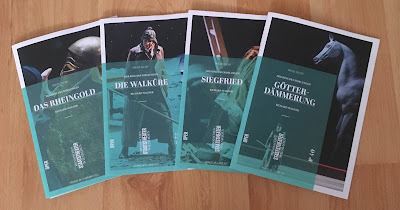As I pointed out in the previous Das Rheingold, Die Walküre
review, it is not so often that Ring Cycle takes operagoes throught specific
time period, historical events or in this case such vast period – from enchant time to the
present-future time.
That is the
case with Wiesbaden's Siegfried and Götterdämmerung productions. Siegfried
being set in to me 1970's, 1980's poor district of a town where in a very old-fashioned
kitchen settings as we can see in the Act 1, Mime plans his lifelong revenge, maniac love/hate pretended feelings
towards Siegfried who's interested only in his "hippie lifestyle" – very keen on
his walkman / headphones music (do you still remember those?) While
Wanderer is portrait here as a man out of town in a suit, and a suitcase. To
me raher overmodernized Act 2 takes us to a bank where Siegfried tries to win
Fafner's Ring by first of all
winning a computer game to enter the building and then defeating his enemy and
taking the Ring with him. Not disturbing but rather interesting staging made me
think about why it hasn't already been staged similarly before. Third act as we all
know returns to Brünnhilde’s statue where she sleeps. The most moving moment
of the opera for me was Wotan's meeting with Erda when both of them sit on the
edge of the statue – being so close to their beloved daughter and yet so far
from her and from each other in reality. Brünnhilde gets her hero and is awaken from her sleep, all ends well.
And all
starts well again (in Götterdämmerung) where after a glorious number with three
Norns, daughters of Erda, weaving laser pistols instead the rope of destiny, singing
beautifully, we already see the couple's house, a modern feng shui style type
of condo with somehow museum pieces placed in the corners, reminding us of the
past heroic moments of both lovers – Brünnhilde’s helmet, Siegfried's sword
Notung. What I liked about this production of Götterdämmerung was the
minimalistic staging of Act 2, you clearly again realize that there is no need
for huge stage decorations and oversize costume which often been the case in
other continental productions. And I can't forget about one more rather personal
moment that stayed with me – Siegfried just before his dead seeing and
remembering “his life in pictures”, surrounded by things he had, remembered a
lived through as a young boy in Siegfried and as a grown up man later on in Götterdämmerung. The end was simply magnificent on all levels. So was the whole
Ring that brought a new meaning, view on such epic work that will always
have something to say...
Siegfried
Conductor Alexander
Joel
Director Uwe Eric Laufenberg
Stage Designer Gisbert Jäkel
Costume Designer Antje Sternberg
Lighting Designer Andreas Frank
Video Falko Sternberg
Dramaturgy Katja Leclerc
Director Uwe Eric Laufenberg
Stage Designer Gisbert Jäkel
Costume Designer Antje Sternberg
Lighting Designer Andreas Frank
Video Falko Sternberg
Dramaturgy Katja Leclerc
Siegfried Andreas Schager
Mime Matthäus Schmidlechner
The Wanderer Jukka Rasilainen
Der Wanderer Thomas Hall
Alberich Thomas de Vries
Fafner Young Doo Park
Erda Bernadett Fodor
Brünnhilde Evelyn Herlitzius
Waldvogel (the woodbird) Stella An
Statisterie
des Hessischen Staatstheaters Wiesbaden, Hessisches Staatsorchester Wiesbaden
Götterdämmerung
Conductor Alexander
Joel
Director Uwe Eric Laufenberg
Stage Designer Gisbert Jäkel
Costume Designer Antje Sternberg
Lighting Designer Andreas Frank
Video Falko Sternberg
Chorus Master Albert Horne
Dramaturgy Regine Palmai
Siegfried Andreas Schager
Gunther Samuel Youn
Alberich Thomas de Vries
Hagen Albert Pesendorfer
Brünnhilde Evelyn Herlitzius
Gutrune Sabina Cvilak
Waltraute / First Norn Bernadett Fodor
Second Norn Silvia Hauer
Third Norn Sabina Cvilak
Woglinde Katharina Konradi
Wellgunde Marta Wryk
Flosshilde Silvia Hauer
Director Uwe Eric Laufenberg
Stage Designer Gisbert Jäkel
Costume Designer Antje Sternberg
Lighting Designer Andreas Frank
Video Falko Sternberg
Chorus Master Albert Horne
Dramaturgy Regine Palmai
Siegfried Andreas Schager
Gunther Samuel Youn
Alberich Thomas de Vries
Hagen Albert Pesendorfer
Brünnhilde Evelyn Herlitzius
Gutrune Sabina Cvilak
Waltraute / First Norn Bernadett Fodor
Second Norn Silvia Hauer
Third Norn Sabina Cvilak
Woglinde Katharina Konradi
Wellgunde Marta Wryk
Flosshilde Silvia Hauer
Chor, Extrachor & Statisterie des Hessischen Staatstheaters Wiesbaden, Hessisches Staatsorchester Wiesbaden








.png)





